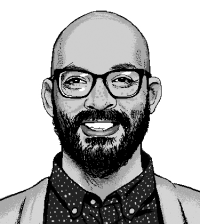Is there no other prophet to consult?
Amid our dying empires and institutions, we might recall the story of King Ahab.

At the end of 1 Kings, the writing is on the wall. King Ahab has a war with the Arameans to the north, and the prophet Micaiah has prophesied his death. Ahab’s response makes me wonder if there are some parallels to our own moment, when we see empires and systems and people wrestling against their ends.
The writing is on the wall in so many spaces of our world. The shifting demographics in the United States, a political system in which gridlock props up the legacies of White supremacy, the frequent reminders of climate change, a global economic system that relies on poverty wages and voracious consumption of natural resources. If the pandemic has made anything clear, it is that the lives we were living before this were not sustainable. Something has to change, but who will listen? How does power respond when its dominance wanes and only its violence remains?
Read our latest issue or browse back issues.
Ahab, even after repenting for theft and the murder of Naboth, sees the perpetuation of his life only in terms of accumulation. He gathers prophets and advisers, who all echo back to him what he wants to hear: “You will conquer!”
Isn’t this how so many institutions function once they have accumulated enough power? They do not need to make room for dissent or uncertainty. They don’t have to account for science or facts or motivation, for whether a tweet is a diversion or whether a war is a political stunt. Institutions accumulate power by becoming the locus of a narrative and a gatekeeper of information. They seek to exist in a space where something is true because they want it to be true.
But while Ahab wants only confirmation of his own ambitions, King Jehoshaphat of Judah, who has been asked to accompany Ahab, sees what’s happening. He sees the quality of the counsel Ahab has called in, and he asks, “Is there no other prophet?” Perhaps there is wisdom in expanding counsel.
“Oh, there’s Micaiah,” Ahab replies, “but he never says anything good about me.” Reluctantly, he summons Micaiah anyway. Micaiah tries to toe the line, but when pressed he says, “I saw all Israel scattered . . . like sheep without a shepherd.”
See? says Ahab. I told you.
Ahab does not hear what Micaiah is saying but instead reduces his words to a personal attack. There’s nothing truthful in his experience or knowledge, Ahab is saying. He’s just playing the race card again! It’s always about gender with her!
When confronted by shifting demographics, by new accounts of what our land is or isn’t, by the opportunity to reread scriptural accounts of sexuality or race or gender, how do we respond to the question, Surely there is another? How do we respond to calls to confess, to repent, to change course?
Too often, institutions are built upon presuppositions that preclude other possibilities. They maintain their power by trying to become a singular truth, by being the one that offers the resources and credentials and authority to approve or disapprove, to hire or fire. And when that doesn’t work, they just move the goalposts, making what was secondary now primary.
Confronted by new ways of seeing, reading, hearing, and being, institutions minimize the wisdom of prophets and try to paint them as “woke warriors,” people more shaped by culture than by scripture, people who just want to do whatever they want and call it God.
But they can’t see God working in our words, experiences, and struggles. They don’t want to, because to acknowledge the truth of our experience is also to reckon with the limitations of the institution, that it can’t keep going on as it always has, that it can’t simply go out and accumulate more and more land, an ever-expanding empire. It can’t keep on churning out the same churches, hiring the same dudes, recycling tired arguments. So instead, institutions try to paint us like we’re ignorant. Even though we learned their material and taught ourselves ours as well.
The refusal is never just rhetorical. After belittling the very advice Ahab cajoled Micaiah to offer, he sends him to jail with limited rations. Confronted with an alternative experience and a word about his own folly, Ahab punishes Micaiah for his words of truth.
After belittling and disregarding truth, how often do institutions then seek to expel it from their midst? To pretend like the only words ever spoken were those that confirmed the very course of action they wanted to pursue in the first place?
In the face of these powers, we can only speak the words God has given us, describe the world as it is, and hold onto the truth and beauty of our people. Amid dying empires and institutions, we may only be able to speak for a moment and try to survive as the king struggles against his inevitable end. In the end, Micaiah’s words are true. I wonder what Ahab is thinking as he sits in a chariot, disguised in common soldier’s clothes but mortally wounded anyway. He tried to cheat death, yet here he is.
It feels like little solace. Death is never the same thing as peace. But perhaps there is hope in the possibility that our words are never our own, that our witness is never an individual affair, and that regimes built on death cannot escape what they have sown. In the meantime, we can speak the words we’ve been given and listen as best we can to the prophets when they come near and have the courage to speak what God has given to them.
A version of this article appears in the print edition under the title “Is there no other prophet?”







